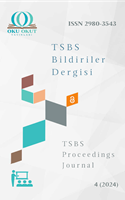Beyzâvî’nin Mezhebî Görüşlerinin Mâide 6. ve 89. Âyetler Bağlamında Değerlendirilmesi
An Evaluation of al-Bayzāwī’s Sectarian Views with Respect to the Verses 6 and 89 of Surah al-Mā’idah
Author(s): Huri ÇokparlamışSubject(s): History of Islam, Sociology of Religion, History of Religion, Qur’anic studies
Published by: Oku Okut Yayınları
Keywords: Tafsir; Bayzāwī; Anwār al-Ṭāzīl; Ablution; Oath;
Summary/Abstract: The Holy Qurʾān is a divine message from Allah, revealed to Prophet Muhammad in Arabic by Gabriel. Revealed in twenty-three years, the verses were memorized and written down by the Companions. The Qurʾān functioned as a guide for life for later generations, and the exegesis studies became a branch of science over time. In this regard, one can mention the work entitled Anwār al-Tanzil and Esrār al-Taʿwīl, by Nāsir al-Dīn Abū Saīd ʿAbdullāh b. ʿUmar b. Muhammad al-Bayzāwī (d. 685/1286), who lived in the 13th century and became famous as an Ashʿarite theologian and Shāfiʿī jurist. This work focuses on the understanding of verses and can be cited as a major work of exegesis taught in madrasas. Al-Bayzāwī conducted a meticulous study while interpreting the verses as he defended the views of his sect by providing evidence and took into account not only the practices of the Companions but also variations in qirāʼāt. This indicates that he had a very sensitive attitude towards his work. In this respect, this paper discusses his views on ablution and oath with respect to the sixth and 89th Verses of Surah al-Mā’idah. It should be noted that ablution is a major example that comes to mind with respect to revealing the differences among different sects. At the same time, the notion of oath is also a critical example that allows us to see the differences among the views of the jurisprudential sects. Thus, this paper evaluates al-Bayzāwī’s sectarian views based on the verses mentioned above. The overall aim of this study is to investigate the commentator’s commentaries on the relevant jurisprudential verses and his unique perspectives on these verses to reveal his approach. The main purpose of the study is to determine whether sectarian affiliation leads to subjectivity in exegesis. In this respect, this study aims to reveal the impact of sectarian approaches on the interpretation of the verses from the perspective of the commentator. A qualitative research method was used in this study. An effort was made to reveal the impact of sectarian approaches to the interpretation of the verses from the perspective of the commentator. This study conducted analyses and offered evaluations by addressing the issue using a descriptive method. By comparing the views of the imāms of each sect, the similarities or differences among them were discussed from a holistic perspective.
Journal: TSBS Bildiriler Dergisi
- Issue Year: 2024
- Issue No: 4
- Page Range: 61-72
- Page Count: 12
- Language: Turkish

